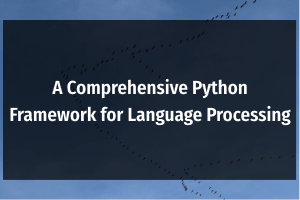In the realm of natural language processing and analysis, the demand for efficient and effective tools has surged across industries. To cater to this demand, a novel Python framework, known as LangChain, has emerged, offering a plethora of features to simplify language-related tasks. This article provides an in-depth exploration of LangChain, highlighting its core functionalities, unique attributes, and how developers can embark on their journey with this framework.
Introducing LangChain
LangChain stands as an open-source Python framework meticulously crafted to streamline language processing and analysis tasks. Its primary objective is to provide developers, researchers, and practitioners with a cohesive toolkit, relieving them of the intricacies of low-level implementation while enabling them to focus on creating robust language-related applications.
Key Features and Functionality
LangChain comes equipped with a range of indispensable features tailored to enhance language processing endeavors. Some of the standout functionalities include:
- Tokenization and Text Preprocessing: Tokenization, a fundamental task in language processing, is made seamless with LangChain. The framework’s built-in capabilities allow text to be effortlessly broken down into individual words, phrases, or sentences. Additionally, LangChain offers functions to clean text, remove stop words, and apply stemming and lemmatization-essential steps in preparing data for further analysis.
- Part-of-Speech Tagging: Part-of-speech (POS) tagging, a cornerstone of language analysis, is effectively addressed by LangChain. It employs advanced POS tagging models that accurately label words with their respective parts of speech, such as nouns, verbs, adjectives, and more.
- Named Entity Recognition: LangChain excels in Named Entity Recognition (NER), a critical task for identifying and categorizing entities within the text. Whether it’s detecting names of individuals, organizations, dates, or other entities, LangChain offers pre-trained models to seamlessly extract this valuable information.
- Sentiment Analysis: Sentiment analysis, a vital tool for gauging the emotional tone of the text, is well-supported by LangChain. Its modules facilitate the classification of text into positive, negative, or neutral sentiments, making it invaluable for analyzing user reviews, social media content, and beyond.
- Language Modeling: LangChain acknowledges the significance of language modeling in natural language processing. The framework boasts pre-trained language models capable of generating coherent and contextually relevant text. These models can be fine-tuned to align with specific dataset requirements.
- Machine Translation: For machine translation tasks, LangChain comes equipped with translation modules that integrate pre-trained translation models. Moreover, the framework’s architecture extends the opportunity to train custom translation models to suit specific applications.
- Extensibility and Customization: LangChain places a strong emphasis on extensibility. Developers can seamlessly integrate domain-specific dictionaries, models, and algorithms, making it a versatile tool capable of adapting to a range of unique requirements.
Getting Started with LangChain: Embarking on a LangChain journey is straightforward:
Installation: Begin by installing LangChain using pip:
pip install langchain
Integration: Incorporate LangChain modules into your Python code to harness its capabilities.
Below is a snippet illustrating tokenization and sentiment analysis:
from langchain import Tokenizer, SentimentAnalyzer
text = "LangChain framework simplifies language processing tasks!"
tokenizer = Tokenizer()
tokens = tokenizer.tokenize(text)
sentiment_analyzer = SentimentAnalyzer()
sentiment = sentiment_analyzer.analyze_sentiment(text)
print("Tokens:", tokens)
print("Sentiment:", sentiment)
Exploration: Delve into LangChain’s comprehensive documentation and tutorials to uncover more functionalities and delve into fine-tuning models for specific tasks
In Conclusion
LangChain emerges as an invaluable Python framework for a multitude of language processing and analysis tasks. Its user-friendly API, coupled with its extensive feature set, makes it an ideal choice for developers and researchers aiming to create potent language-centric applications efficiently. Whether it’s sentiment analysis, machine translation, or any language-related pursuit, LangChain equips you with the tools needed to excel in your endeavors. Embrace LangChain and unlock the true potential of language processing with unparalleled ease.
If you have skills in PHP programming and you want to enhance your career in this field, a PHP Certification from StudySection can help you reach your desired goals. Both beginner level and expert level PHP Certification Exams are offered by StudySection along with other programming certification exams.




